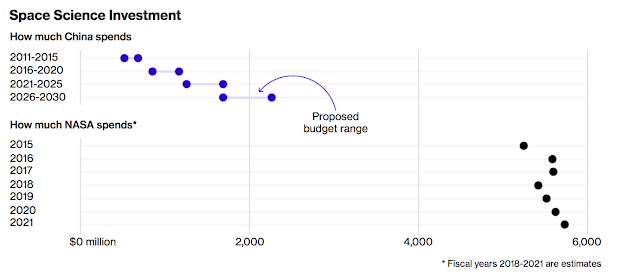China could triple space science spending and has several startup rocket companies as well
by noreply@blogger.com (brian wang) from NextBigFuture.com on (#2HJB2)
Though the exact value of China's spending on its space programs remains shrouded in secrecy, many analysts peg its civilian space budget at around $3 billion annually in recent years, a fraction of the $19.3 billion the United States allocated to NASA in 2016. There a push within China's government to triple spending on space science (from $700 million to $2.1 billion) as well as the emergence of a small but growing group of privately backed space start-ups suggest that both Chinese industry and government see long-term economic benefits in their investments in space technologies.

In 2016, China launched more rockets than Russia for the first time, equaling the 22 rockets launched by the United States. Included among those missions was Shenzou 11, which carried a crew of two to dock with China's Tiangong-2 spacecraft, a temporary orbiting space habitat serving as a stepping stone for a larger, permanent Chinese space station in the early 2020s.
In the past year a number of Chinese space launch start-ups have emerged, largely with the backing of universities and hedge funds. Two-year-old OneSpace is developing a 59-ton launch vehicle that it plans to launch for the first time in 2018. ExPace, founded early last year, plans to market its solid-fueled Kuaizhou rocket to those looking to loft small satellites into orbit. Likewise, Landspace - launched in 2015 - claims it will conduct its first commercial launch this year.

ExPace's Kuaizhou rocket is reportedly based on the launcher for Chinese antisatellite weapons and missile defense interceptors, while Landspace's rocket is based on the government's Long March 11 rocket (for its part, OneSpace was reportedly founded with support from the National Defense Science and Industry Bureau).
Launching small satellites atop rocket technologies borrowed from China's national space programs is simply a way into the market. OneSpace plans to eventually develop a manned space capsule, and Landspace is reportedly mulling a far more powerful, liquid-fueled rocket that could compete directly with the likes of SpaceX, Blue Origin or France's Arianespace.
Read more











In 2016, China launched more rockets than Russia for the first time, equaling the 22 rockets launched by the United States. Included among those missions was Shenzou 11, which carried a crew of two to dock with China's Tiangong-2 spacecraft, a temporary orbiting space habitat serving as a stepping stone for a larger, permanent Chinese space station in the early 2020s.
In the past year a number of Chinese space launch start-ups have emerged, largely with the backing of universities and hedge funds. Two-year-old OneSpace is developing a 59-ton launch vehicle that it plans to launch for the first time in 2018. ExPace, founded early last year, plans to market its solid-fueled Kuaizhou rocket to those looking to loft small satellites into orbit. Likewise, Landspace - launched in 2015 - claims it will conduct its first commercial launch this year.

ExPace's Kuaizhou rocket is reportedly based on the launcher for Chinese antisatellite weapons and missile defense interceptors, while Landspace's rocket is based on the government's Long March 11 rocket (for its part, OneSpace was reportedly founded with support from the National Defense Science and Industry Bureau).
Launching small satellites atop rocket technologies borrowed from China's national space programs is simply a way into the market. OneSpace plans to eventually develop a manned space capsule, and Landspace is reportedly mulling a far more powerful, liquid-fueled rocket that could compete directly with the likes of SpaceX, Blue Origin or France's Arianespace.
Read more